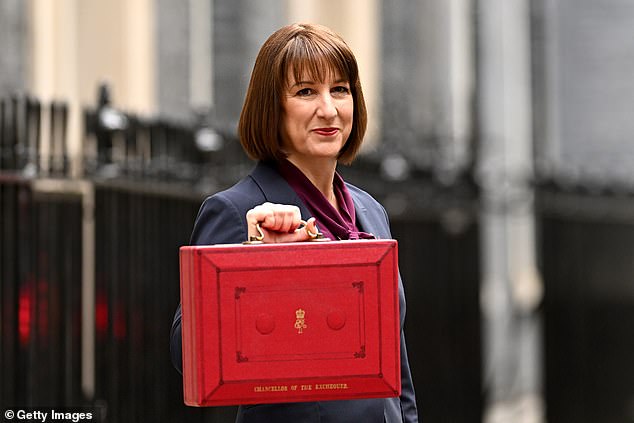With every day that passes it becomes more apparent that the Chancellor of the Exchequer will, later this month in the Budget, break Labour’s manifesto commitment not to increase income tax.
Assuming Rachel Reeves is still Chancellor (50:50), it seems she will have no choice.
There is a humungous black hole in the nation’s finances (much of it of Labour’s making) that needs addressing – and it is growing at a frightening rate: one week reported to be £40 billion, the next a mind-boggling £50 billion.
No wonder, the bond markets are getting edgy again, judging by the recent rise in gilt yields over the past few days.
I said as much in last week’s column when predicting that in the Budget a ‘big nasty tax bombshell awaits us akin to that sprung last year on UK business plc’ in the form of employer National Insurance increases.
I added: ‘Maybe it will be one that involves breaking Labour’s manifesto, such as a hike in income tax.’
Like many financial experts, I fear the cat is now firmly out of the bag. Income tax rises are coming our way, albeit with an ameliorating sweetener for workers.
In recent days, a combination of intelligence from informed sources, the evasive responses to questions on the likely manifesto breach from both the Prime Minister and Rachel Reeves, and other telling signals all point to higher income tax rates come April 6 next year.

The Chancellor of the Exchequer will, later this month in the Budget, break Labour ’s manifesto commitment not to increase income tax
Assuming the Chancellor survives the current demands for her resignation as a result of breaking rules on letting out her home in Dulwich, south London, any Budget income tax increase could well trigger another wave of calls for her to fall on her sword.
But if she delivers what Labour MPs really want from the Budget – more (not less) welfare spending, an increase in the minimum wage and higher taxes on the wealthy – she’ll probably survive.
My belief is that the Chancellor will brazen it out on Budget Day and state that, irrespective of the income tax rise, Labour’s overall commitment not to increase the tax burden of ‘workers’ remains 100 per cent intact. She’s good at half-truths.
She will argue this by announcing that the increase in income tax will be countered by an equivalent cut in employee National Insurance. As a result, some 30 million workers who pay both taxes will be no worse off.
The big tax hit will be on pensioners who don’t pay employee NI once they reach state pension age, even if they continue to work. Landlords and the self-employed will also be adversely affected.
The hand of Torsten Bell, pensions minister and Reeves’ influential Budget adviser, seems to be all over this plan to breach the manifesto.
Before becoming a Labour MP, Bell was head of the Resolution Foundation, a hard-Left think-tank that spends its days dreaming up ever new ways of turning the UK into a socialist state.

The big tax hit will be on pensioners who don’t pay employee NI once they reach state pension age, even if they continue to work. Landlords and the self-employed will also be adversely affected
So, more benefits for the low paid, higher taxes for the wealthy, and a quest to break the state pension triple lock.
Although Bell left the think-tank last year to stand as a Labour candidate in the General Election, he very much remains Mr Resolution Foundation.
And it is no coincidence that, just over a month ago, his former employer put out a document proposing exactly what the Chancellor is now planning: namely, a 2p rise in income tax offset by a 2p decrease in employee NI.
This would mean new income tax rates of 22 per cent (basic), 42 per cent (higher) and 47 per cent (additional).
Such a move, the foundation said, would raise a chunky £6 billion net for the Chancellor.
Explaining the rationale, ‘principal’ economist Adam Corlett said it was imperative that Reeves ‘should do all she can to avoid loading further pain on to workers’ pay packets’. He added: ‘She can do this by switching our tax base from employee National Insurance and on to income tax, which is paid by a far broader group in society.’
I know what many retired readers will think of this tax move – they will be absolutely horrified. They will see it as yet another
punishing attack on their household finances, already undermined by high energy bills, persistent inflation and the continued freezing of the annual personal income tax allowance at £12,570.
The personal allowance has been set at £12,570 since April 2021, and Labour has given no indication that it is minded to defrost it in April 2028 when the current freeze is meant to end.
Indeed, it could be extended even further in the Budget.
In recent months I’ve lost count of the number of elderly readers who have contacted me complaining that their modest income is now being clobbered by tax.
Sadly, that tax hit will be even greater in April when those on the full ‘new’ state pension will start receiving payments of £12,548 a year as a result of a 4.8 per cent increase triggered by the triple lock. It will edge them ever closer to the personal allowance.
For those with top-up income from a company or self-invested personal pension, tax will become an issue, maybe for the first time in their retirement.
For Bell, higher taxes on the elderly will represent a personal victory: a counter to the triple lock, which he sees as unaffordable.
But he will also see this as a mere stepping stone. His next bold move, maybe to be made when he succeeds Reeves as Chancellor (Labour MPs love him more than Reeves), will be to dismantle the triple lock.
Of course, £6 billion of extra tax won’t fill the nation’s black hole, but it is likely to bag the Chancellor far more revenue than any other tax-raising measure.
It’s why a raft of new taxes will sit alongside this likely income tax rise. They will probably include a mansion tax on £2 million plus properties, a National Insurance attack on limited liability partnerships (used by accountants and lawyers), a clampdown on pension tax-free cash, a continued freezing of tax thresholds (alongside the personal allowance freeze), and a curtailment of gifts made to mitigate inheritance tax bills.
Whatever ends up in the Budget, it isn’t going to be fun for the vast majority of us. On the Chancellor’s behalf, I apologise – because you won’t get one from Reeves.
